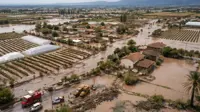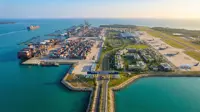Sea piracy to impact price of crude
21 Nov 2008
 Mogadishu: Ridiculous it may sound, but a bunch of sea pirates operating out of fishing vessels and speedboats, and armed with nothing more sophisticated than Kalashnikovs and RPGs (Rocket Propelled Grenades), are set to push the price of crude oil upwards and negatively impact recessionary trends already in motion in Europe and elsewhere.
Mogadishu: Ridiculous it may sound, but a bunch of sea pirates operating out of fishing vessels and speedboats, and armed with nothing more sophisticated than Kalashnikovs and RPGs (Rocket Propelled Grenades), are set to push the price of crude oil upwards and negatively impact recessionary trends already in motion in Europe and elsewhere.
 A immediate fallout of the spectacular hijack of Saudi super-tanker Sirius Star, executed in just 16 minutes, was the decision by one of the world's biggest shippers, Denmark's AP Moller-Maersk to dispatch its tankers around the Cape of Good Hope.
A immediate fallout of the spectacular hijack of Saudi super-tanker Sirius Star, executed in just 16 minutes, was the decision by one of the world's biggest shippers, Denmark's AP Moller-Maersk to dispatch its tankers around the Cape of Good Hope.
"Vessels without adequate speed or freeboard will for the time being avoid the Gulf of Aden and seek alternative routing south of the Cape of Good Hope and east of Madagascar," the company said.
Tanker association, Intertanko, said many other tanker owners are expected to follow in Maersk's wake.
With the threat of a $25 million ransom for the recently hijacked Sirius Star ringing out loud and clear, calls for tougher action against the menace, is now ratcheting up.
The Suez Canal-Gulf of Aden region is one of the world's key maritime routes.
The decision by Maersk to ask its tankers to round the Cape of Good Hope had the secretary general of the International Maritime Organisation (IMO), Efthimios Mitropoulos, warning the UN Security Council that "a series of negative repercussions would ensue."
Mitropoulos said a typical voyage from Saudi Arabian oil port Ras Tanura to Gibraltar in the Mediterranean would almost double in length taking an extra 12 days. The delay would not only delay replenishment of European and US oil stocks but each journey would also consume an extra 750 metric tons of fuel.
 This consumption would also result in the emission of an extra 2,335 tons of carbon dioxide, Mitropoulos said.
This consumption would also result in the emission of an extra 2,335 tons of carbon dioxide, Mitropoulos said.
In the short term, he said, freight rates could initially more than double before settling higher by about 25 to 30 per cent.
Mitropoulos also called on the Security Council to shore up provisions in resolutions authorizing states to enter Somali waters to combat pirates, so that they had "clear rules of engagement."
Rules of engagement
Responding to an outcry, the US, which has a formidable military presence in the general Gulf area, said it would be seek United Nations support for a resolution that will tighten international measures against pirates.
It said a new draft would "extend the authorities" set out in an earlier resolution adopted in June. The previous text called on nations in hot pursuit of pirates to enter Somali waters with the permission of the Somali government.
The IMB's assessment of the situation as "out of control," has seen Red Sea states meeting in Cairo and pledging cooperation to tackle the threat. Few specifics were forthcoming, however.
Russia announced it would dispatch more warships to these waters. Russia's ambassador to NATO, Dmitry Rogozin, also issued a call for an international ground military operation in the region, as well as providing a boost to sea patrols which are patently yielding little results.
British foreign secretary, David Miliband, pepped up morale amongst the seafaring community, urging the world to fight the "scourge of hostage taking."
The Indian Navy has had the most success so far with two interceptions by its stealth frigate, INS Tabar, one of which resulted in the sinking of a pirate 'mother vessel.' Pirates use mother ships, which are hijacked trawlers or deep-sea dhows, to tow speedboats from which they launch their attacks.
It took them 16 minutes to board the Sirius Star for instance.
Noel Choong, head of the piracy reporting centre at the IMB in Kuala Lumpur, said "the situation is already out of control," but praised the Indian navy action in sinking the mother ship. "We hope more navies will follow suit and stop suspected pirate boats," he added.
The Gulf of Aden-Suez Canal shipping lane provides direct access to Gulf oil to the markets of Europe primarily and also provides passage to more than 12 per cent of the total volume of oil transported by sea.



















